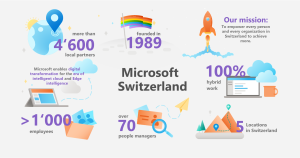In a world that is becoming more and more digitized, storing data in the Cloud is not only the natural next step, but is also more agile, time efficient, secure, environmentally friendly and cost effective.
However, change is not always easy. And discussions around the security of the data stored in the cloud or how would this affect our customers, have slowed down digitization in the public sector of Switzerland. Furthermore, different interpretations of the privacy laws, such as GDPR (General Data Protection Regulation) have sparked debates around the topic.
When faced with complexity, they (customers) want greater simplicity. It’s our mission to deliver that and help our customers adapt quickly to a changing world.
We believe that anything less than comprehensive security is no security at all.
Vasu Jakkal Corporate Vice President, Security, Compliance and Identity
Public Sector in Switzerland
There is a clear need for the public sector to digitize faster, including moving data to the cloud. However, it takes very good knowledge of local laws and requirements to be able to assure the usage of cloud for the public sector.
With over 30 years of history in Switzerland, Microsoft has both respect and deep understanding of the laws and regulations and can meet the country’s demands.
Regarding the use of cloud in the public sector, there are specific whitepapers that address common legal aspects in this context, give answers to frequent questions and even refer to the 26 cantonal legislation situations.
Furthermore, the migration to the cloud needs to be carefully considered and planned. As in every project, there are different risks that need to be identified and assessed. The decision of migrating to the cloud must be based on a deep-dive risk assessment. The respective document below is intended to support organizations in this process.
Microsoft Azure and Microsoft 365 Cloud Designs
Promising to manage data securely and create a safe environment for the digital transformation, Microsoft wants to facilitate the use of cloud services in the public sector through Azure and Microsoft 365 Cloud Design guidelines.
Designed to make it easier for the public sector to use Microsoft cloud services, Microsoft Azure and Microsoft 365 Cloud Designs include guidelines that simplify compliance with the Swiss local regulations and laws. Based on very high IT security standards, the package contains guidelines, templates, policies, and trainings that together clarify how cloud services could be used in accordance with regulations, requirements and laws that apply in the Swiss Public Sector.
Switzerland is a well-structured country with a strong safety net around digital security and protection of personal data and privacy. Through the Public Sector Cloud Designs, Microsoft continues to help the Swiss digitalization process, always having security and privacy as top priority.
Here you can find all the documents relating the Public Sector Microsoft Azure and Microsoft 365 Cloud Design:
- Azure Services in the Public Sector in Switzerland (DE, PDF)
- Azure Services dans le secteur publique de la Suisse (FR, PDF)
- Azure Services in the Swiss Public Sector (EN, PDF)
- Microsoft 365 in the public sector in Switzerland (EN, PDF)
- Microsoft 365 for Public Sector in Switzerland (EN, PDF)
- Microsoft 365 dans le Secteur public en Suisse (FR, PDF)
- Cloud Governance & Security in the Public Sector in Switzerland (DE, PDF)
- Cloud Governance & Security dans le secteur publique de la Suisse (FR, PDF)
- Cloud Governance & Security in the Swiss Public Sector (EN, PDF)
- Instructions for a fact-based risk assessment (DE, PDF)
- Mode d’emploi pour une évaluation factuelle des risques (FR, PDF)
- Cloud & Government White Paper (EN, PDF)
- Livre Blanc Cloud et Autorités Publiques (FR, PDF)
- Contemporary topics in Cyber Security by Leticia Hollenstein – Isolutions (EN, PDF)
Possible implementation partners (who have gone through the Microsoft training)
Alphabetical list of Microsoft partners including contact person and e-mail
- Abraxas
Contact person: Urs Schlatter (e-mail: [email protected]) - Bechtle Schweiz
Contact person: Reto Keller (e-mail: [email protected]) - Beltronic IT AG
Contact person: Loris Meier ([email protected]) - BitHawk AG
Contact person: Nicola Caviezel (e-mail: [email protected]) - Corporate Software
Contact person: Patrick Sommer (e-mail: [email protected]) - Elca
Contact persons for French: Olivier Trinh ([email protected]) and German: Daniel Remmele ([email protected]) - Experts Inside
Contact person: Samuel Zürcher (e-mail: [email protected]) - ipt
Contact person: Michael Wachter (e-mail: [email protected]) - isolutions
Contact person: René Eggmann (e-mail: [email protected]) - itnetx
Contact person: Roland Bieri (e-mail: [email protected]) - Joker IT
Contact person: Matthias Hummler (email: [email protected]) - One Step Beyond
Contact person: Hugo Pain (e-mail: [email protected]) - ORBIS Schweiz AG
Contact person: Fabian Haas (e-mail: [email protected]) - Nexplore
Contact person: Stefan von Niederhäusern (e-mail: [email protected]) - novaCapta
Contact person: Nikolay Marinov (e-mail: [email protected]) - scopewyse
Contact person: Martin Meyer (e-mail: [email protected]) - SoftwareONE
Contact person: Rico Andreoli (e-mail: [email protected]) - Swisscom
Contact persons: Manuel Calvino (for French, e-mail: [email protected]); Mattia Braga (for Italian, e-mail: [email protected]); Kadir Uyar (for German, e-mail: [email protected]) - T-Systems
Contact person: Camille Brichet (e-mail: [email protected]) - UMB
Contact person: Marc Zimmermann (e-mail: [email protected]) - Upgreat
Contact person: Andre Meier (e-mail: [email protected]) - Zühlke Engineering AG
Contact person: Stefan Jäger (e-mail:[email protected])













